This was the year in which we all stayed home as much as possible. Thanks to the COVID-19 pandemic, most movie theaters were shut, and most of us experienced new films in the intimacy of our living rooms, alone or surrounded by family. We spent more time watching TV, but our choices were less affected by massive marketing campaigns. Indeed, Greater Good published more articles about new movies than we have in previous years, including ones about Pixar’s Soul and “10 New Movies to Make You Feel Better About Being Stuck at Home.”
Many of those films belong among this year’s “Greater Goodies,” our annual list of movies that highlight the strengths and virtues that help humans flourish in even the worst circumstances, offered in anticipation of the Academy Awards. However, this year’s list does present an opportunity, which is to zero in on a theme: resilience. While our contributors highlight different aspects of each film that viewers might emulate—mindfulness, gratitude, self-respect, compassion, adaptability, and more—they all contribute to the characters’ ability to survive and bounce back from disaster.
The Attachment Theory Award: Kajillionaire
This movie is not for everyone. It almost wasn’t for me: It took me a full day to finish, because I kept hitting pause. The parents in the film, played by Robert Jenkins and an unrecognizable Debra Winger, were too unbearably sociopathic for me.
I’m glad I persisted, because Kajillionaire ultimately becomes a meaningful story about the power of attachment—our ability to turn to others for comfort and to provide comfort to others.
When we meet the parents and their adult daughter, Old Dolio, they’re robbing a post office. For much of the film, the three of them are semi-homeless scavengers who seem totally unable to see humanity in themselves or in other people.
That begins to change when they meet Melanie (Gina Rodriguez), a soul who seems well on her way to being as lost as they are. Somehow, she connects with Old Dolio, and as the two come together, they start to bring out the best in themselves and each other.
Old Dolio is played by Evan Rachel Wood, who I last saw as a murderously beautiful android in the HBO series Westworld. Like her fellow star Winger, Wood is unrecognizable with baggy clothes, unkempt hair, and deadened voice and face.
However, it’s her body language that defines the character. Old Dolio doesn’t move like other people—she expresses herself in a way that feels simultaneously graceful and damaged—and it’s that uniqueness that Melanie spots and comes to cherish. The scene in which Old Dolio dances to her favorite song is the strangest and most beautiful in a story filled with strange and beautiful moments. It manages to be silly, scary, and lovely, all at the same time.
There’s something childlike in both Melanie and Old Dolio, but the movie is really about how they come to “reparent” each other—that is, they learn to trust by giving and receiving the attention and care that both of them need and crave. While Kajillionaire starts out in an ugly place, it ultimately arrives at one that’s more beautiful than any of its characters could have imagined. – Jeremy Adam Smith
The Human Connection Award: Land
Edee (played by Robin Wright, who also directs the film) leaves her home in the city and strikes out to a cabin deep in the northern wilderness. Her plan is to get as far away from other people as possible, preferring to be alone rather than abide company. Though we don’t at first know the cause of her devastating pain, it’s clear that Edee will go to extreme lengths to escape.
As she settles into life in the wilderness, Edee aims for self-sufficiency and absorption with basic needs to keep her feelings at bay. She’s surrounded by spectacular, awe-inspiring scenery, but she’s also inexperienced in living off of the land. When disaster strikes and her food supply runs perilously low, her isolation, once desirable, now threatens to kill her.
By chance, a seasonal hunter, named Miguel (Demián Bichir), comes across her cabin and discovers Edee at the brink of death. He nurses her back to life, drawing on his empathy for what she’s going through. As Miguel begins to teach her what he knows about hunting and trapping, he shares an even more important lesson—the need for human connection. His friendship is what might ultimately save her.
At one point in the story, Edee asks Miguel why he’s helping her. “You were in my path,” he says. This simple statement communicates the heart of this beautiful film: We are each other’s keeper. Only by looking out for one another and caring for one another can we survive—a lesson not just for Edee, but for all of us. – Jill Suttie
The Mindful Gratitude Award: The Map of Tiny Perfect Things
Remember the 1993 classic, Groundhog Day? The teen protagonists in The Map of Tiny Perfect Things certainly do—and name-checking that movie helps them to live through their own one-day time loop.
Mark (Kyle Allen) and Margaret (Kathryn Newton) are perfectly aware that they are the Bill Murray characters in a familiar situation. But while Murray’s weatherman started out as a vile human being, Mark and Margaret aren’t bad kids at all.
In fact, Mark uses his situation as a superpower to do small good deeds around their suburban enclave: rescuing kittens, stopping beach balls from hitting heads, preventing a bird from pooping on a pedestrian, and the like.
Margaret’s reaction is different from his—and it’s their difference that gradually becomes the point of the film. She emerges as a case study in what happens to people who are trapped in loss and suffering. To help her move on to her next stage, Mark needs to get out of his own head and see her as her own person with a story that is separate from his.
That message about empathy is one every teen needs to hear—and let me tell you, my fellow parents of teenagers, you could do a lot worse than watching this movie with your kids. It’s predictable, but in a way that I found more comfortable than boring.
It has a message for adults, as well. The title of the movie refers to a map Mark and Margaret create of the magical moments they come to see in their little town, by watching the same day over and over again. The map is a gratitude exercise, as well as one in mindfulness. And as so much research teaches us, gratitude and mindfulness are the best antidotes we have against “hedonic adaptation,” the tendency to get used to the good (and the bad) things in life. It’s the map that helps Mark and Margaret stay awake in their otherwise deadening routines.
That’s a good message for every adult during the COVID-19 pandemic, when so many of our lockdown days seem to blur together. It tells us that we can find meaning and beauty in repetition, if we’re willing to look. – Jeremy Adam Smith
The Self-Respect Award: Ma Rainey’s Black Bottom
It’s been a year since any of us could see the work of the late playwright, August Wilson, in a real theater. But Ma Rainey’s Black Bottom on Netflix gave me just the taste I needed. Like all of the works in Wilson’s series that spans Black life over the century, it has both historical context and relevance for today.
In 1927, Ma Rainey, a well-known blues artist, is hired by white producers to record her songs. This is the story of a single day in a recording studio in Chicago. Viola Davis (who won her first Oscar in another raw Wilson production, Fences) physically transforms herself into Ma Rainey. Chadwick Boseman plays Levee Green, one of the members of Ma’s band. Boseman (best known for his role as Black Panther in the Marvel Cinematic Universe) died of cancer before the release of the film. And given how rivetingly he portrays the ambitious and manic Levee Green, it is hard to watch knowing how sick he was during filming. But praise for his performance is no pity party, for Boseman leaves it all on the screen. The whole cast give great performances, including the Georgia Jazz Band members, played by Colman Domingo, Michael Potts, and Glynn Turman.
In this movie, we feel the pain and stories of each of these characters, as they speak to race and racism, and to the struggles of the Black music artist. At one point, Rainey gives a powerful monologue about the distrust she has for white people who don’t respect her as an artist, and how she sees that they would love to steal her work.
Both Ma and Levee exemplify the human need to be seen and respected for their talent and their work. But Levee’s story shows what happens when we are not. However talented he might be, all the things that Ma says about what labels do to Black artists end up happening to him. Ma Rainey is the hero of the story because she is willing to act on her insight—not just for herself, but on behalf of all Black artists. This is a film about being willing to lay it all out there for a work you believe in, while still being willing to walk away, if that respect is not there. – Andrea Collier
The Adaptation Award: Minari
Minari is a masterclass for storytellers in creating vivid characters—but for the rest of us, its most powerful lessons involve adaptation.
When we meet the Yi family, they’re arriving from California at a mobile home in 1980s Arkansas. Monica (Yeri Han) doesn’t want to be there, but her husband Jacob (Steven Yeun) dreams of turning the land into a farm. Their two children, David (Alan S. Kim) and Anne (Noel Cho), simply accept the new situation, for the most part. Almost immediately the Korean family takes a place in their new rural community. They find a church to attend, make friends, and hire a Korean War veteran named Paul to help around the farm.
Like many of the family’s white neighbors, at first Paul (Will Patton) seems threatening in his oddity: His idea of Sunday worship involves walking a giant wooden cross down a country road. But Paul is no villain, or even a redneck stereotype. In fact, he proves himself to be the family’s most important ally—one among many—as they find ways to overcome the obstacles they face in their new land.
When Monica’s mother, Soon-ja (Yuh-Jung Youn), arrives from South Korea, she offers anchovies as a gift, which triggers a crying jag in Monica. “You’re crying again?” says Soon-ja. “Because of anchovies?” Monica replies, “I’m sorry you have to see how our life is now.” Her mother is mystified. “Why? Because your house has wheels? It’s fun!” At that moment, Soon-ja seems to make it her mission to help the family stick together and adapt to their circumstances.
Jacob and Monica share a strength that is also a flaw: They’re both stubborn as hell. To survive on the farm, they need to listen to what Soon-ja, Paul, David, and Anne have to tell them: Accept reality as it changes, for better and worse, and find ways to change with it. – Jeremy Adam Smith
The Nature Connection Award: My Octopus Teacher
During a long retreat at his Cape Town home, filmmaker Craig Foster commits to swimming every day in the kelp beds off the coast from his house. He wants to reconnect with nature in a profound way, without anything (including diving gear) coming between him and his immersion experience.
During one dive, he comes across an octopus living among the kelp. As the octopus gets used to his presence, Foster is able to observe her behavior in the wild and learn about her particular emotions, intelligence, and survival instincts. It’s a joy to watch how clever octopuses can be and to learn about the many ways they protect themselves from predators. But what takes this movie way beyond the usual nature flick is how it focuses on the growing friendship between Foster and the octopus. Their trust and love for one another is incredibly moving to watch.
My Octopus Teacher showcases the power of deeply empathizing with beings different from ourselves. It suggests that if we look beyond our anthropocentric view, we’ll see that all animals are worthy of respect and reverence. Perhaps, if more of us modeled Foster’s humility and took time to understand the world beyond us, we’d find the motivation to fight for nature’s survival. Watching this beautiful, inspiring film is a good start. – Jill Suttie
The Compassion Award: Nomadland
There have been countless indicators over the past year suggesting a need for greater compassion and social connection in our society. Nomadland explores both of these topics through the life of Fern, played by Frances McDormand.
When the gypsum plant where Fern and her husband work closes and then her husband suddenly dies, Fern is left alone and jobless. She packs up her belongings and lives in her van, driving across the U.S. looking for work. While on her journey, she connects with others who’ve chosen a similar path in life—and this informal community serves as her social support system, allowing her to sustain this new lifestyle.
The beauty of the movie is in its juxtapositions. Nomadland mixes fiction with the real-life stories of “houseless” people, playing themselves in the movie. We discover that many came to their path due to loss and tragedy—and that it has often led them to redemption. The nomads take seasonal jobs at e-commerce giant Amazon, to support the most meager necessities of their lives. Then there is the juxtaposition of what most of us believe homelessness looks like, contrasted with the natural beauty of the American landscapes that Fern traverses as she looks for work, extending her living space to the great outdoors.
This movie evokes compassion for the diversity of our life experiences—and it reinforces the importance of social connection to sustain us. – Shanna B. Tiayon
The Community Responsibility Award: One Night in Miami…
The year was 1964, and a relatively unknown Cassius Clay took to the ring in Miami Beach to beat his opponent Sonny Liston. Clay became the heavyweight champion of the world that night—and later he would become Muhammad Ali.
That much is historical fact. One Night in Miami… is a fictionalized “what if”: What happens when Clay gets together with three famous friends in a hotel that night?
Each of the men is in the midst of a transformational fork in the road. Clay (played by Eli Goree) is considering joining the Nation of Islam. Malcolm X (played by Kingsley Ben-Adir) has had a major rift with his mentor Elijah Muhammad, the leader of the Nation of Islam. Jim Brown, a star NFL running back, is questioning his future in football and the way the league treats Black athletes. Sam Cooke (Leslie Odom, Jr.) is trying to become a crossover artist, playing to white audiences as well as a Black one.
At its heart, the story is about fame, social responsibility to your community, and what you owe back to that community. It’s also about what happens when you put four big egos at the top of their games in a room! The tensions are tight, and the challenges are heated. But ultimately there is love and respect among these men, all of whom would become legends. – Andrea Collier
The Mindfulness Award: Sound of Metal
Sound of Metal tells the story of Ruben Stone (Riz Ahmed), a drummer in a metal band duo who begins to lose his hearing. This sets off a personal crisis for Ruben, whose two passions are his music and his girlfriend Lou (Olivia Cooke), who is the other half of the band.
At her urging, he reluctantly decides to seek help from a rural community center that helps deaf adults and children adjust to the world. A soft-spoken man named Joe (Paul Raci) takes Ruben under his wing, slowly teaching him to come to grips with the reality of a much quieter world. One of the things he asks Ruben to do is to sit calmly in a room and write. Although the movie never mentions the word, Joe is giving Ruben a crash course in mindfulness meditation.
“The world does keep moving, and it can be a damn cruel place,” he tells Ruben. “But for me, those moments of stillness, that place, that’s the kingdom of God.”
The film’s message is that while we don’t have total control over what happens to us in this life, we often do have the capacity to choose how we respond to whatever it throws out way. Sound of Metal wants us to take meditation seriously because in the turbulence of this existence, we can still find peace and solace if we are willing to look for it. – Zaid Jilani
The Self-Love Award: Sylvie’s Love
Sylvie’s Love stretches the boundaries of the Black experience that is frequently portrayed in movies, offering us a character that exudes self-determination and resilience. It’s a love story, yes, but that starts with Sylvie’s love for herself and her belief in the quality of love she deserves from others.
The movie takes place in 1960s Harlem. Sylvie, played by Tessa Thompson, meets a rising saxophonist named Robert, played by Nnamdi Asomugha. Sylvie isn’t single, but her fiancé is overseas serving in the Korean War. The courtship between Sylvie and Robert is fast, passionate—and short lived, when Robert gets a long-term music gig in Paris.
Sylvie goes on to marry her fiancé on his return. While he offers her stability and social acceptance as a wife, she soon realizes this means she must bury her desires for a career and a deeper, richer quality of romantic love. Through a series of ups and downs, Sylvie finds her way back to herself and eventually back to Robert.
Sylvie demonstrates qualities of self-determination and the capacity to take control over one’s life, at a time when her race and gender made both difficult. To overcome those oppressive obstacles, Sylvie must reconstruct her self-worth—a sense that she deserves the things she desires for her life. Sylvie’s Love is a masterclass in the transformational power of self-love. – Shanna B. Tiayon
What films did you see during the past year that inspired you?

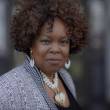


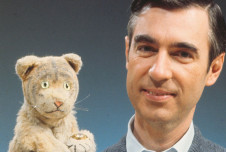
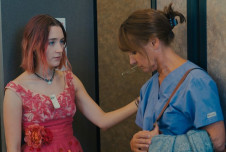
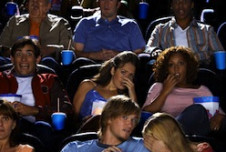
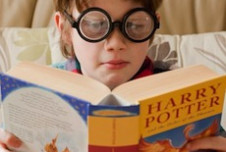
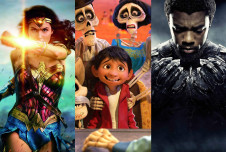
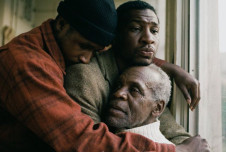
Comments